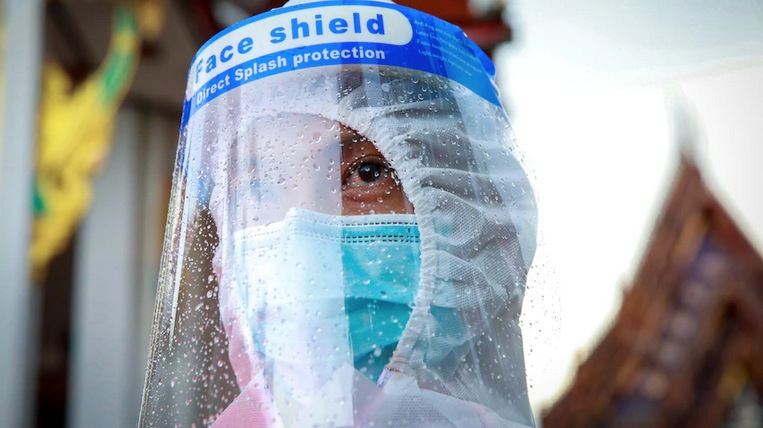Source: ABC news
On a steaming hot afternoon in Bangkok, as the first droplets of an afternoon downpour begin to fall, Narin Pannak and Achittapon Rodsantad shelter under the open, back door of a van.
As the rain starts pelting down, they suit up from head-to-toe in full protective gear, gather their equipment and make a dash for the home in front of them.
Inside, there is a 50-year-old woman with COVID-19 who has collapsed in an upstairs bedroom and is struggling to breathe.
Mr Pannak and Mr Rodsantad, who are both volunteers from the ‘Saimai Will Survive’ group, are there to provide much-needed oxygen, medicine, and reassurance.
As Thailand’s medical system struggles under a surge of COVID-19 cases, the volunteers have been run off their feet in Bangkok’s Saimai district and beyond.
Having started as a small team of just five, Saimai Will Survive now has more than 100 members, who risk their own health to provide care for desperate people waiting for a hospital bed.
“I think if we didn’t do this, there would be more people dying every day,” said the group’s founder, Ekapob Laungprasert, 38.
“I believe … it’s just the start, because the real war is about to happen.”
Thailand struggles to vaccinate as Delta runs rampant
Thailand was considered one of the leading models for containing the COVID-19 pandemic until a third wave began at the start of April.
It is now one of the worst-hit countries in south-east Asia, with the number of new infections surpassing one million and more than 9,000 have died from the virus.
Daily case numbers have started to stabilise over the past week, but health authorities say while that is encouraging news, they are concerned that the number of fatalities remains high.0100200300400500Days since 100th case0.11101001k10kDaily known newcases since 100th caseThailand
Values shown are 5-day averages.
Bangkok is currently experiencing about 4,000 new cases a day amid the rapid spread of the Delta variant, which has accounted for most of the new infections.
The virus is spreading rapidly through large families who live together, tightly packed slums, markets, and crowded construction worker camps.
Despite thousands of recoveries every day, hospitals, field hospitals, and medical hotels keep hitting capacity and ventilators are scarce.
“It is so difficult for people to get through to the government hotline [to find a hospital bed],” Mr Laungprasert told the ABC.
“I understand there are a lot of calls but the government needs to implement better measurements, to allow citizens to get access to treatment easier than this.
“You will see a lot more people die at home.”
One of the problems Thailand is experiencing as it attempts to contain the spread of COVID-19 is a slow and disorganised vaccine rollout.
Less than 10 per cent of the population has been fully vaccinated so far.
Confronting videos of COVID patients battling symptoms at home
As part of their work, the volunteers broadcast videos of some of their house calls live on Facebook to try to raise awareness about the seriousness of COVID-19 and what they are doing to help their community.
The videos make for confronting viewing, as the volunteers help infected people at their most vulnerable, including a mother and her three small children who all had the virus.
None of the volunteers get paid, but most have the time to help after losing their jobs because of the economic downturn during the pandemic.
“They’re using this crisis of losing their jobs and instead of sitting at home doing nothing, which is useless, they get up and help society,” Mr Laungprasert said.
“Everyone in my team is scared …
I asked every volunteer in my team if they were ready to risk getting infected and they said they were.”
Volunteer groups have been an important safety net for Thailand during the pandemic, with many organisations delivering oxygen, driving people to hospital and setting up community isolation centres.
Others have distributed care packages, fed pets owned by people in hospital, or handed out hot meals.
Food delivery is especially important for people isolating at home in poor areas, who would normally shop daily at local food stalls and markets, but cannot afford to turn to big online supermarkets that home deliver.
Panchana Vatanasathien, who runs ‘Food for Fighters’ (FFF), said she set up the group to try to deliver “as much as we can to the people or the patients who do home isolation”.
“Many volunteer groups help each other because we have no hope with our current government, so this is to show the power of small people,” she said.
FFF operates out of a car park at Bangkok’s Chulalongkorn University and is a hive of activity, with up to 20 volunteers cooking, packaging up food, and loading it into cars and tuk tuks for delivery to Bangkok’s largest slum Klong Toey and other low socio-economic areas.
Ms Vatanasathien, who has a background in charity management, is taking phone calls and directing the whole operation.
“I strongly believe that Thai people, we have good hearts and we have compassion to help each other,” Ms Vatanasathien said.
“I tell myself and my team that we don’t make any magic, we don’t make any special things, we just do what we can in this crisis.”
Anger grows at government’s COVID-19 response
Former Opinion Editor for the Bangkok Post, Sanitsuda Ekachai, told the ABC she believed volunteers have felt compelled to step up because they have lost confidence in Thai authorities.
“I think the outpouring of help right now actually reflects public anger against the government,” Ms Ekachai said.
“People are very angry and they feel that if the government cannot help people, ‘we will do it and we will show you how to do it.'”
She said she thought the volunteers were “very courageous” to go into the homes and communities of infected people.
“They can’t stand people dying in front of their eyes so they are saying, ‘we will do what we can do,'” she said.
“And they could do much more if they had more resources and decision-making power, but the government and the bureaucracy are against decentralisation to protect their power.”
Street protests and car convoy rallies have been held calling for Prime Minister Prayuth Chan-ocha to resign over his management of the pandemic and the vaccination rollout.
Despite an emergency decree banning public gatherings of more than five people, a few hundred people have been coming together in Bangkok.
The student-led group, which demanded Mr Prayuth’s removal last year, has returned with broader support from people angered by the coronavirus situation.
Some of the protests have turned violent, with protesters hurling petrol bombs, paint, rocks and firecrackers, while riot police have used tear gas, water cannon and rubber bullets.
Mr Chan-ocha has said he has no plans to stand down.
Responding to questions from the ABC, Thai Government spokesperson Anucha Burapachaisri said the government was “focusing its effort on addressing the spread of COVID-19, especially the Delta variant”.
“At this juncture, political differences should be put aside so that all sides can come together with a view to resolving the multidimensional challenges brought about by COVID-19, especially the strain on the public health system as well as economic livelihoods of the people,” Mr Burapachaisri said in a written statement.
He said that despite the ban on public gatherings, the government had taken a “lenient approach” towards protesters, especially given “recent political gatherings have increased the risk of local transmissions of COVID-19”.
Mr Burapachaisri did not respond to questions about volunteers stepping in to help where there government had fallen short.
He said Thailand was encountering a “temporary shortage of vaccines” but was working closely with the public and private sectors, as well as other countries, to procure more doses.
He added the Thai government was “doing all it can [and] leaving no stones unturned” to manage the outbreak, and was aiming “to inoculate 70 per cent of the population, or 50 million people, by the end of the year to create herd immunity”.


